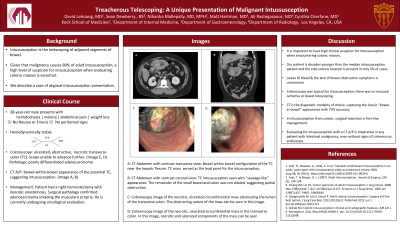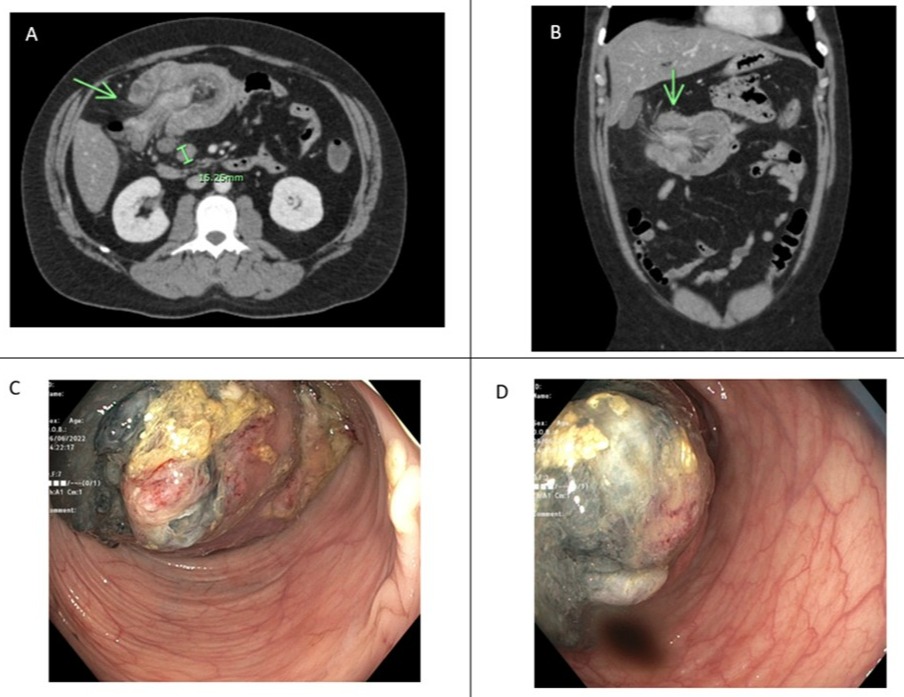Back


Poster Session B - Monday Morning
Category: Colon
B0151 - Treacherous Telescoping: A Unique Presentation of Malignant Intussusception
Monday, October 24, 2022
10:00 AM – 12:00 PM ET
Location: Crown Ballroom

Has Audio

David Lehoang, MD, MBA
Keck School of Medicine, University of Southern California
Los Angeles, CA
Presenting Author(s)
David Lehoang, MD, MBA, Sean Dewberry, , Niharika Mallepally, MD, MPH, Matt Hartman, MD, Ali Rastegarpour, MD, Cynthia Cherfane, MD
Keck School of Medicine, University of Southern California, Los Angeles, CA
Introduction: Intussusception occurs when a segment of bowel telescopes into an adjacent segment of bowel. Adult intussusception is rare (5% of cases) but has significant mortality if not managed urgently. Given that malignancy causes 80% of adult intussusception, a high level of suspicion for intussusception when evaluating colonic masses is essential. This clinical vignette describes how intussusception - even when presenting atypically via gastrointestinal (GI) bleed - can be diagnosed.
Case Description/Methods: A 38 year old male presented with one month of hematochezia, melena, abdominal cramps, decreased appetite, and weight loss. He had no hematemesis or cardiovascular risk factors. The patient had no history of H. pylori infection, NSAID use, surgery, or family history of GI cancer. He was hemodynamically stable without abdominal tenderness or peritoneal signs. Melena was in the rectum. Relevant labs were hemoglobin 10.6, white blood cell count 12,400, and platelets 866K. Chest x-ray and EGD were unremarkable. Colonoscopy revealed an ulcerated, necrotic transverse colon (TC) mass obstructing the lumen. The scope failed to be advanced proximal to the mass. The remainder of the distal lumen was unremarkable without signs of ischemia. Biopsy showed a poorly differentiated adenocarcinoma. An urgent CT demonstrated a bowel-within-bowel appearance of the proximal TC, suggesting intussusception. The patient had a right hemicolectomy with ileocolic anastomosis. Surgical pathology confirmed adenocarcinoma invading the muscularis propria. He is currently undergoing oncological evaluation.
Discussion: This case highlights the importance of a high clinical suspicion for intussusception when encountering obstructing, necrotic colonic masses. Our patient is decades younger than the median intussusception patient and the colo-colonic location is present in only 5% of cases. His lower GI bleed is uncommon as was the lack of bowel obstruction symptoms. The colonoscopy however, was typical for intussusception; there was no mucosal ischemia or bowel telescoping. CT is the diagnostic modality of choice, capturing the classic “bowel-in-bowel” appearance with 75% accuracy. In intussusception due to cancer, surgical resection is first-line management. Ultimately, evaluating for intussusception with a CT abdomen is imperative in any patient with intestinal malignancy, even without signs of ischemia on endoscopy.

Disclosures:
David Lehoang, MD, MBA, Sean Dewberry, , Niharika Mallepally, MD, MPH, Matt Hartman, MD, Ali Rastegarpour, MD, Cynthia Cherfane, MD. B0151 - Treacherous Telescoping: A Unique Presentation of Malignant Intussusception, ACG 2022 Annual Scientific Meeting Abstracts. Charlotte, NC: American College of Gastroenterology.
Keck School of Medicine, University of Southern California, Los Angeles, CA
Introduction: Intussusception occurs when a segment of bowel telescopes into an adjacent segment of bowel. Adult intussusception is rare (5% of cases) but has significant mortality if not managed urgently. Given that malignancy causes 80% of adult intussusception, a high level of suspicion for intussusception when evaluating colonic masses is essential. This clinical vignette describes how intussusception - even when presenting atypically via gastrointestinal (GI) bleed - can be diagnosed.
Case Description/Methods: A 38 year old male presented with one month of hematochezia, melena, abdominal cramps, decreased appetite, and weight loss. He had no hematemesis or cardiovascular risk factors. The patient had no history of H. pylori infection, NSAID use, surgery, or family history of GI cancer. He was hemodynamically stable without abdominal tenderness or peritoneal signs. Melena was in the rectum. Relevant labs were hemoglobin 10.6, white blood cell count 12,400, and platelets 866K. Chest x-ray and EGD were unremarkable. Colonoscopy revealed an ulcerated, necrotic transverse colon (TC) mass obstructing the lumen. The scope failed to be advanced proximal to the mass. The remainder of the distal lumen was unremarkable without signs of ischemia. Biopsy showed a poorly differentiated adenocarcinoma. An urgent CT demonstrated a bowel-within-bowel appearance of the proximal TC, suggesting intussusception. The patient had a right hemicolectomy with ileocolic anastomosis. Surgical pathology confirmed adenocarcinoma invading the muscularis propria. He is currently undergoing oncological evaluation.
Discussion: This case highlights the importance of a high clinical suspicion for intussusception when encountering obstructing, necrotic colonic masses. Our patient is decades younger than the median intussusception patient and the colo-colonic location is present in only 5% of cases. His lower GI bleed is uncommon as was the lack of bowel obstruction symptoms. The colonoscopy however, was typical for intussusception; there was no mucosal ischemia or bowel telescoping. CT is the diagnostic modality of choice, capturing the classic “bowel-in-bowel” appearance with 75% accuracy. In intussusception due to cancer, surgical resection is first-line management. Ultimately, evaluating for intussusception with a CT abdomen is imperative in any patient with intestinal malignancy, even without signs of ischemia on endoscopy.

Figure: A: CT Abdomen with contrast transverse view shows the bowel within bowel configuration of the transverse colon near the hepatic flexure. Mass within the transverse colon served as the lead point for the intussusception.
B: CT Abdomen with contrast coronal view demonstrates similar findings of transverse colon intussusception with “sausage-like” appearance. The remainder of the small bowel and colon was not dilated, suggesting partial obstruction.
C: Colonoscopy image of the necrotic, ulcerated circumferential mass obstructing the lumen of the transverse colon. The obstructing nature of the mass can be seen in this image.
D: Colonoscopy image of the necrotic, ulcerated circumferential mass in the transverse colon. In this image, necrotic and ulcerated components of the mass can be seen.
B: CT Abdomen with contrast coronal view demonstrates similar findings of transverse colon intussusception with “sausage-like” appearance. The remainder of the small bowel and colon was not dilated, suggesting partial obstruction.
C: Colonoscopy image of the necrotic, ulcerated circumferential mass obstructing the lumen of the transverse colon. The obstructing nature of the mass can be seen in this image.
D: Colonoscopy image of the necrotic, ulcerated circumferential mass in the transverse colon. In this image, necrotic and ulcerated components of the mass can be seen.
Disclosures:
David Lehoang indicated no relevant financial relationships.
Sean Dewberry indicated no relevant financial relationships.
Niharika Mallepally indicated no relevant financial relationships.
Matt Hartman indicated no relevant financial relationships.
Ali Rastegarpour indicated no relevant financial relationships.
Cynthia Cherfane indicated no relevant financial relationships.
David Lehoang, MD, MBA, Sean Dewberry, , Niharika Mallepally, MD, MPH, Matt Hartman, MD, Ali Rastegarpour, MD, Cynthia Cherfane, MD. B0151 - Treacherous Telescoping: A Unique Presentation of Malignant Intussusception, ACG 2022 Annual Scientific Meeting Abstracts. Charlotte, NC: American College of Gastroenterology.
